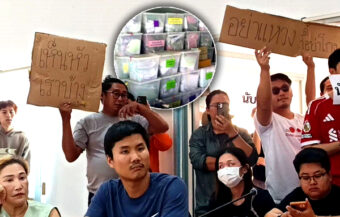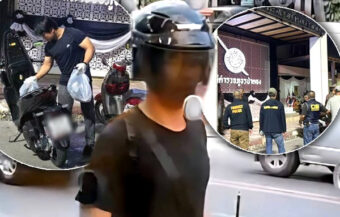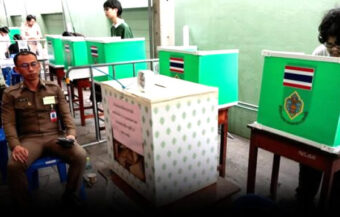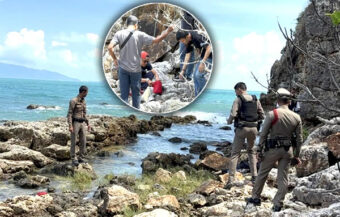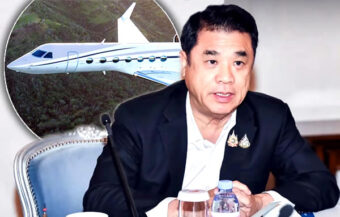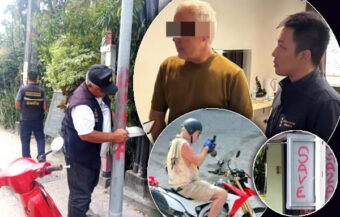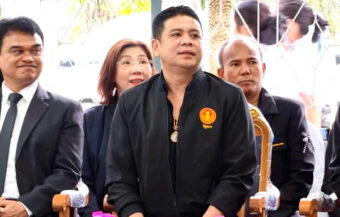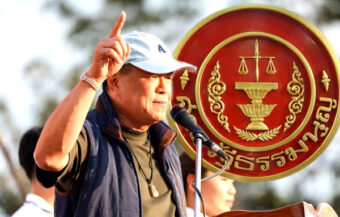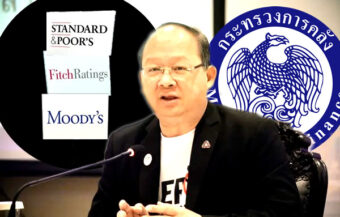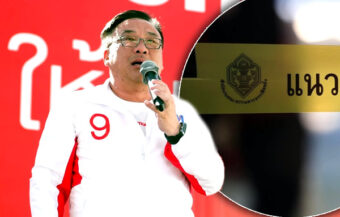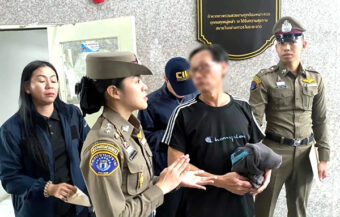Thai army chopper forced into emergency landing as Cambodia bans Thai fruit, cuts power near Poipet and shifts to Vietnam grid. Military patrols surge, workers blocked, tensions soar, and trade stalls as both nations brace for further escalation.
Border tensions are escalating along the Thai-Cambodian frontier. On Tuesday, the Royal Thai Army breathed a sigh of relief after an army helicopter made an emergency landing following mechanical issues in Ubon Ratchathani. Meanwhile, Thai forces are tightening security along the border—especially near Poipet—where workers and gamblers are now barred from crossing into Cambodia. At the same time, Cambodia has banned Thai fruit imports and is severing electricity connections with Thailand.
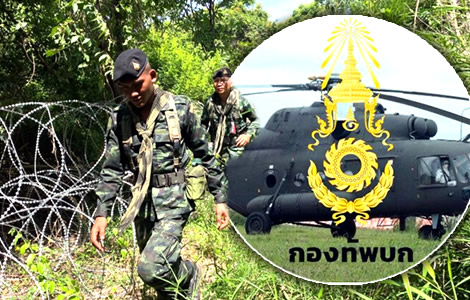
Tensions continue to mount along Thailand’s 817-kilometre border with Cambodia. The situation has grown more unstable following a series of political provocations, cross-border trade restrictions and military incidents.
On Tuesday, Cambodia abruptly banned Thai fruit imports. The decision disrupted trade and further frayed relations between the neighbouring countries. On the same day, Cambodian authorities cut off electricity from Thailand at two key points near the Poipet border. Power outages followed across parts of Banteay Meanchey Province, including Poipet City.
Cambodian officials later rerouted the electricity supply to Vietnamese sources. However, the switch caused blackouts and voltage fluctuations in many areas.
Old bomb explosion and army helicopter incident heighten fears and instability along the eastern border
By Wednesday, the situation had escalated further. A mechanical excavator triggered a bomb explosion on the Cambodian side of the border. The explosive was reportedly an old device that detonated when struck by the digger. The driver was seriously injured and local residents were left shaken.
Meanwhile, on Tuesday in Ubon Ratchathani, a Royal Thai Army helicopter lost control and was forced to make an emergency landing. The aircraft, operated by the 2nd Army Area under the Suranaree Task Force, was conducting a routine resupply mission. It had been delivering personnel and equipment to a forward base in Nam Yuen District when the malfunction occurred.
According to Colonel Richa Suksuwanon, deputy army spokesman, the pilot executed a successful emergency landing. Minor injuries were reported, and all personnel were quickly evacuated to nearby hospitals. The Royal Thai Army is currently investigating the cause of the incident.
At the same time, military operations along the Thai-Cambodian border have intensified. The Burapha Task Force issued new orders on June 17. Thai nationals working in Cambodian casinos and entertainment venues are now barred from leaving the country through Sa Kaeo Province. The order is intended to stop possible smuggling, illegal labour and the movement of individuals linked to illicit activities.
24-hour land, water, and aerial patrols launched as Thai military locks down Aranyaprathet border zone
In support of this directive, the Aranyaprathet Task Force and the 12th Ranger Regiment Control Unit launched a broad enforcement campaign. Patrols now operate 24 hours a day. Ground units monitor known crossing points on foot. Naval teams patrol key border waterways such as Khlong Luek, Khlong Phrom Hot, and Khlong Nam Sai. Aerial surveillance drones scan dense jungles and remote areas to detect unauthorized movements.
To close gaps in border control, units have deployed additional observation posts and rapid response teams. The goal is to prevent illegal crossings and enforce the government’s restrictions on cross-border movement.
According to Major General Khomkrit Rattanachaya, commander of the Burapha Task Force, the situation demands strict vigilance. He urged every unit to exercise extreme discipline and coordination. “This is a time of changing threats,” he said. “Everyone must be alert and work together.”
Further north, Ubon Ratchathani’s governor conducted a direct inspection of the Chong Bok border area. The visit included a review of bunker readiness, civilian evacuation plans, and communication systems. Local officials are preparing for worst-case scenarios, including border incursions or sudden surges in displaced persons.
Cambodian checkpoint shutdown strands Thai trucks and worsens export delays at Ban Khlong Luek crossing
Back in Sa Kaeo Province, the permanent border crossing at Ban Khlong Luek has become a focal point. Tensions peaked after Cambodian authorities temporarily closed the Poipet crossing. Thai freight trucks queued along the road were brought to a halt. Goods bound for Cambodian markets remained stuck, worsening economic losses for Thai exporters.
Despite the brief reopening of the Poipet crossing the next morning, disruptions continued. Cambodian power officials arrived at the border and disconnected a transmission line that supplies power from Thailand.
The disconnection took place near the Cambodian immigration office, beside the Thai-Cambodian Friendship Bridge. Authorities then linked up the national grid to power from Vietnam. This led to a blackout lasting about 20 minutes across parts of Poipet.
While power was restored using Vietnam’s supply, many residents complained of unstable electricity. Flickering lights and equipment damage were widely reported. Some areas experienced repeated outages throughout the day.
Social media erupts after Cambodian power cut sparks blackouts and technical issues at Poipet crossing
Online forums and Facebook pages lit up with concern. One popular Thai-language page warned Thais in Poipet to prepare for an immediate return. “Neighboring countries have started cutting power,” the post read. “This is psychological warfare. Prepare to come back if possible.”
Other social media users posted photos and updates about the electricity cuts. Some accused Cambodian authorities of provoking instability. “They cut the line right in front of us,” one post read. “Now scanners at the border don’t work. This is gangster behaviour.”
According to Thai electricity officials, Cambodia failed to provide proper notice of the power cut. The Electricity Generating Authority of Thailand (EGAT) received a late-night request to disconnect the ARB0 circuit at four locations in Khlong Luek.
However, the Ayutthaya Power Distribution Control Center denied the request due to missing documentation. Despite the denial, Cambodian officials proceeded with the disconnection.
Cambodia disconnects Thai electricity lines near Poipet in a test to shift to full domestic grid control
By 6:00 a.m. on June 17, Thai authorities confirmed that electricity had been removed at two coordinates near the Poipet border crossing. These included the power pole in front of the checkpoint and another near the railway bridge. Cambodian officials claimed the disconnection was a test of their ability to run the local grid independently.
Meanwhile, on the economic front, Cambodian importers have begun shifting their supply chains. Many now source consumer goods such as staples and factory supplies from Vietnam and Laos. This reflects a decline in cross-border trade with Thailand, especially as checkpoints tighten and tensions rise.
Diplomatically, the dispute continues to deepen. Cambodia’s referral of its territorial disagreement with Thailand to the International Court of Justice in The Hague has been met with disapproval in Bangkok. Thai officials view the move as provocative and unproductive.
Senate President, strongman and de facto leader Hun Sen has also intensified his public rhetoric. In recent remarks, he said the only people who fear court are “thieves.” Thai leaders consider this another signal of hostility and disregard for dialogue.
Thai and Cambodian military deployments rise as diplomacy stalls and tension threatens to spiral further
So far, there has been no sign of diplomatic talks or joint de-escalation measures. Instead, both nations are reinforcing their military positions. Thai troops remain on high alert along the length of the border. Surveillance operations have expanded. Travel restrictions are in effect.
The situation remains volatile. With trade disruptions, power instability, and increased military deployments, the risk of further incidents remains high. Communities along the border are anxious. Security forces are prepared for escalation.
Hun Sen warns Jatuporn: ‘You know how capable I am’ in sinister message as the formal relationship plummets
Cambodia outflanks Thailand again even as talks took place in Phnom Penh. Insists on ICJ court ruling
Cambodia a big loser from the border spat. Over 1 million Khmer workers in Thailand unlikely to return
Local officials, meanwhile, continue to monitor conditions. They have set up contingency plans, secured key facilities, and issued advisories to residents. In Sa Kaeo and Ubon Ratchathani, emergency coordination centres have been activated.
Certainly, Thailand and Cambodia appear to be entering a period of growing hostility. The once-fluid cross-border relationship has been disrupted. With no diplomatic breakthrough in sight, the tension is expected to continue in the days ahead.
Therefore there is a heightened risk of a mishap and even further damage to Thai Cambodian trade and trust.


